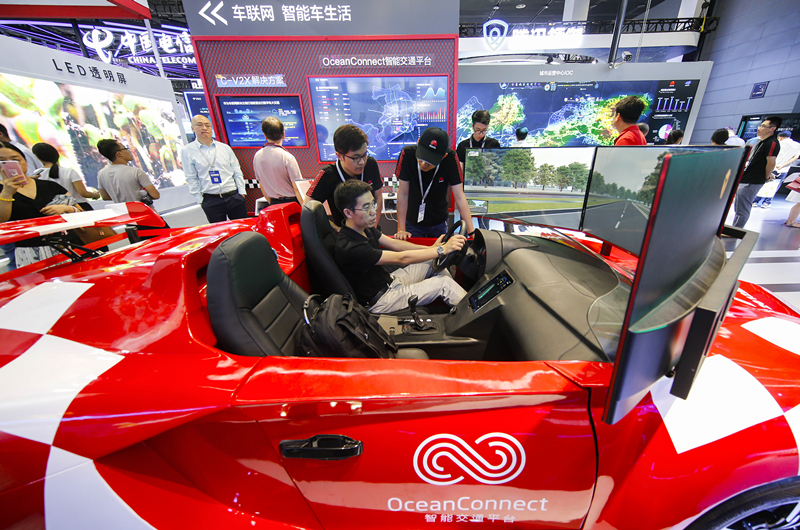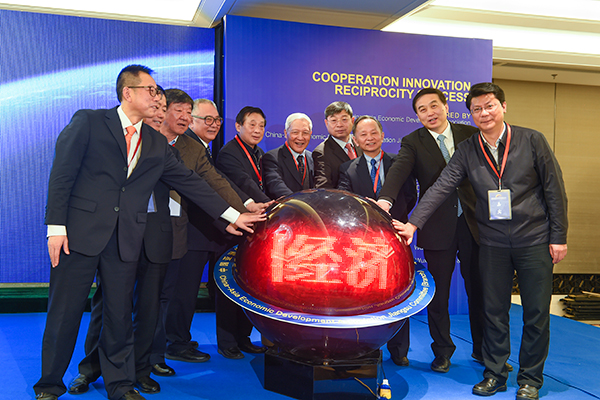
From the People’s Daily app.
This is Story in the Story.
China has reassured private businesses of continued, equal, and favorable policies compared with their state-owned counterparts as the private sector has become a significant part of the economy and a major source of market vitality.
The country will implement and optimize policies that support the development of private and non-public economy and remove relevant constraints, Premier Li Keqiang said during the Annual Meeting of the New Champions 2018 in September.
Li said the Chinese government had constantly taken measures to reduce taxes and fees on small, medium-sized and micro enterprises, while reducing their financing costs and easing their financing difficulties.
"Most of these enterprises are privately-owned and have generated the most jobs for the country,” Li said.
The premier's remarks came as the Chinese economy has entered a new period requiring a higher level of innovation and entrepreneurship.
Meanwhile, Fan Gang, president of a Shenzhen-based think tank called the China Development Institute, said that China will increasingly rely on internal innovation to improve economic development – and that private businesses needs to take more risks.
Private businesses have emerged as a vibrant force in national economic and social development, currently providing more than 60 percent of China's GDP, 60 percent of fixed-asset investment, 75 percent of technological innovation and 90 percent of new urban jobs.
By the end of 2017, there were 27 million private companies across the country.
Today’s Story in the Story will look at how China’s private economy is thriving thanks to the country’s various reform policies.

A futuristic concept car at the 2018 World Internet of Things Expo in Wuxi, Jiangsu province, last month is equipped with Internet of Vehicles technology, which collects and analyzes traffic and driving data. (Photo: China Daily)
In the 40 years since China began its reform and opening-up, the number of self-employed people in Wuxi, Jiangsu Province, has multiplied by 752 times.
In 2017, the city's GDP stood at 1.05 trillion yuan ($153 billion). Its private economy, which reached 689.6 billion yuan, accounted for 65.6 percent of the GDP, according to the Wuxi bureau of statistics.
Wuxi has 12 enterprises on the list of China's top 500 enterprises and 24 on China's top 500 manufacturers list. Twenty-five enterprises have annual operating income exceeding 10 billion yuan.
As the birthplace of China's modern industry and commerce, Wuxi has been known as "little Shanghai" for years due to its flourishing economy, especially private economy.
In 1978, Wuxi had only 506 self-employed people, among whom 45 worked in the downtown area. By July 2018, it had more than 380,000 people registered as self-employed, according to the Wuxi industry and commerce bureau.
In 1980, Wuxi restarted registering private companies. By the end of the 1980s, more than 70,000 people had been registered as owning such companies. Cui Hailong, a self-employed man who now runs many companies across the country, was one of them.
"People here have the tradition and courage to set up their own businesses," Cui said. "Good policies from the government help accelerate the growth of the private economy."
Cui started to sell peacock feathers when he was a college student in 1984. He and a friend managed to make 9,000 yuan by selling the first feathers they collected in Yunnan Province.
Later, he started his own clothing wholesale business, advertising company and a trading company.

The inauguration ceremony is held for the founding of CAEDA Jiangsu Committee on Jan 11, at Taihu Hotel, Wuxi, Jiangsu province. (Photo: China Daily)
China’s private economy also provides over 80 percent of jobs and contributes more than 70 percent of technological innovation and new products in the country, according to Gao Yunlong, head of the All-China Federation of Industry and Commerce.
In August, China unveiled its latest ranking for top 500 private enterprises, with telecom equipment giant Huawei and e-commerce firm Suning atop the list amid sound development of the country's private business.
The list by the All-China Federation of Industry and Commerce (ACFIC) came at the 2018 Summit of China Top 500 Private Enterprises held in Shenyang, the capital of northeast China's Liaoning Province.
Revenues of the nine largest private firms all exceeded 300 billion yuan ($44 billion) in 2017. The top companies include Huawei, Suning, Amer International, JD.com, Weiqiao Pioneering Group, Legend Holdings, and Evergrande.
Now, more Chinese private companies are investing in countries and regions along the Belt and Road and into research and development.
Wang Maozhang, former director of Wuxi's industry and commerce bureau, said the number and quality of private companies have greatly advanced over the past 40 years.
" The policies and markets have kept improving and growing for the private economy," he said.
(Produced by Nancy Yan Xu, Raymond Mendoza, Lance Crayon and Da Hang. Music by: bensound.com. Text from China Daily and Xinhua.)


